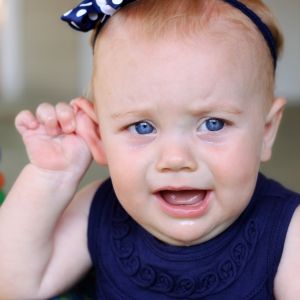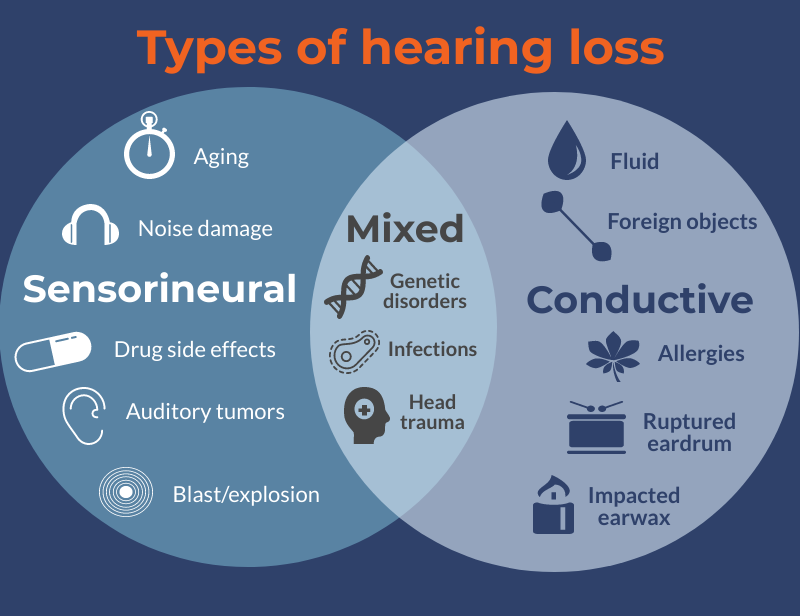|
www.HealthyHearing.com |
Types of hearing loss
By Emily Ostrowski, content manager, Healthy Hearing  Reviewed by
Amy Sarow, AuD, clinical audiologist Reviewed by
Amy Sarow, AuD, clinical audiologist Last updated on: May 22nd, 2025 Learn about the three main types of hearing loss—sensorineural, conductive, and mixed. Discover causes, symptoms, treatments, and how to find help near you. Key points:
What are the three types of hearing loss?The main types of hearing loss are sorted into three categories.
Conductive vs sensorineural hearing loss, along with "mixed" hearing loss. What is sensorineural hearing loss?Sensorineural hearing loss (SHNL) is the most common type of hearing loss. SNHL occurs when there is damage to either the tiny hair-like cells of the inner ear, known as stereocilia, or the auditory nerve itself, which prevents or weakens the transfer of nerve signals to the brain. This type of hearing loss is permanent. CausesThe most common causes of SNHL are aging (known medically as presbycusis) or exposure to loud noise (noise-induced hearing loss). However, other factors can also cause or raise your risk of developing SNHL, including:

of hearing loss you have. If a child is born with sensorineural hearing loss, it is most likely due to a genetic syndrome or an infection passed from mother to fetus inside the womb, such as toxoplasmosis, rubella or herpes. SymptomsMany people with SNHL will experience high-frequency hearing loss, resulting in the following:
TreatmentThere is no medical or surgical method to reverse SNHL. However, it can be treated with hearing aids or cochlear implants, depending on how severe your hearing problems are. Hearing aids are typically recommended for mild to moderate cases, helping to amplify sound and improve communication. For more severe or profound hearing loss, power hearing aids or cochlear implants may be a better option. What is conductive hearing loss?
cause of temporary conductive hearing loss. A less common type of hearing loss is conductive hearing loss, which occurs when there is an obstruction or damage to the outer or middle ear that prevents sound from being conducted to the inner ear. Conductive hearing loss may be temporary or permanent, depending on the cause. CausesCauses can be broken down by whether they affect the outer or middle ear: Outer ear
Middle ear
SymptomsA person with conductive hearing loss has issues with sound loudness, but can still hear clearly because their inner ear and auditory nerve are functioning. People with this type of loss often find that simply turning up the volume on the radio or TV helps them hear better. Additional symptoms can include:
TreatmentUnlike sensorineural hearing loss, conductive hearing loss can be reversed in some cases, but not all. For example, conductive losses caused by wax impaction, foreign objects, abnormal growths or ear infections can often be corrected with medical treatments, like earwax removal, antibiotics or surgical procedures. Conductive hearing losses caused by other abnormalities, like stenosis of the ear canal, exostoses, otosclerosis and ossicular chain discontinuity are more difficult to treat medically and may be considered permanent. Treatment in this case may include hearing aids or bone-anchored implantable devices. What is mixed hearing loss?As the name suggests, mixed hearing loss is a combination of sensorineural and conductive hearing loss. CausesMixed hearing loss commonly occurs when the ear sustains some sort of trauma. It also can happen gradually over time when one hearing loss is compounded by another. For example, a person with a long-standing conductive hearing loss might start to also experience SNHL as they age. Alternatively, a person with age-related hearing loss may have a temporary mixed hearing loss due to earwax impaction. Blast injuries or other types of trauma can cause both sensorineural and conductive hearing loss. SymptomsThe symptoms of mixed hearing loss will be some combination of those listed above for the other two types of hearing loss. TreatmentTreatment options for mixed hearing loss can depend on whether the loss is more sensorineural or conductive in nature. If a larger part of the loss comes from a conductive issue, surgery and other treatments may be most effective. If a greater portion of the loss is sensorineural, hearing aids or implantable devices can work better to improve hearing. In some cases, a combination of multiple treatment options will be used. What about hearing loss in just one ear?Some people are born with hearing in only one ear. In other cases, a person may lose hearing in one ear as a child or adult. All types are collectively known as single-sided deafness. Causes of hearing loss in one ear can be sensorineural or conductive. Treatment can vary depending on what's causing the hearing loss and how long a person has had it. What to do if you experience sudden hearing lossIf you experience hearing loss that comes on suddenly or worsens rapidly over a few days, seek medical help right away. This type of hearing loss is known as sudden sensorineural hearing loss or SSHL. It can sometimes be reversed, but urgency is key. Quick treatment within the first two weeks of symptoms gives you the best chance to restore your hearing. Finding a hearing provider near youIf you or a loved one has hearing loss, it's important to visit a specialist to determine the cause as well as the best treatment options. Many cases of conductive and mixed hearing loss can be treated medically, often by a general practitioner or an ear, nose, and throat (ENT) specialist. Nearly all types of hearing loss are treatable with hearing aids, implantable devices and/or assistive listening devices. Visit our directory of consumer-reviewed hearing clinics to connect with a professional who will guide you with care and expertise, helping you find the best path forward. Emily Ostrowski, content manager, Healthy Hearing
You are reading about: Related topics
More information about hearing aids, hearing aid brands, assistive devices and tinnitus. Featured clinics near me
Earzlink Hearing Care - Reynoldsburg Find a clinicWe have more hearing clinic reviews than any other site! Related contentThe Healthy Hearing Report |
|
www.HealthyHearing.com |
Types of hearing loss
By Emily Ostrowski, content manager, Healthy Hearing  Reviewed by
Amy Sarow, AuD, clinical audiologist Reviewed by
Amy Sarow, AuD, clinical audiologist Last updated on: May 22nd, 2025 Learn about the three main types of hearing loss—sensorineural, conductive, and mixed. Discover causes, symptoms, treatments, and how to find help near you. |




 Emily is an experienced journalist and medical content writer based in Maine. Passionate about delivering enlightening and accurate content, she is committed to empowering people to make informed choices regarding their hearing health.
Emily is an experienced journalist and medical content writer based in Maine. Passionate about delivering enlightening and accurate content, she is committed to empowering people to make informed choices regarding their hearing health.